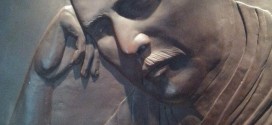I have lived as a philosopher, and I die as a Christian.” These were, supposedly, the last words of Giacomo Casanova, the 18th century’s most infamous adventurer, trickster, gambler and libertine. It is just the sort of thing he would have said, for he was a master of self-justification. Defending his exploits came as naturally to Casanova as slurping oysters from the bodice of a nun in a Venetian casino.
In the preface to his “History of My Life,” Casanova (1725-98) admitted that “cultivating whatever gave pleasure to my senses was always the chief business of my life.” He felt born for the opposite sex, so “I have always loved it and done all that I could to make myself loved by it.” He also made no bones about the fact that he was “extravagantly fond of good food.” But he insisted that “the power of my senses never drew me from my duty when I had one.” And what were those duties? Conveniently, Casanova does not seem to have been aware of many.
When he emptied fools’ purses, it was “to cure them of their folly by opening their eyes.” He didn’t feel guilty about it, because he was not motivated by avarice. As for women, “when love enters in, both parties are usually dupes,” so “reciprocal deceit cancels itself out.” In Casanova’s moral arithmetic, two wrongs somehow always made a right. A sterner accountant would point out that Casanova did not deceive only those lovers who had deceived him.
Continue reading the main story
Still, few readers of Laurence Bergreen’s new biography, “Casanova: The World of a Seductive Genius,” will emerge from it wholly disapproving of this remarkable man. Casanova’s charm was evidently prodigious; he could win over old popes as well as young girls. His saving graces included limitless curiosity, resilience and joie de vivre, as he bounced shamelessly from one misadventure to the next. He cheerfully acknowledged at the end of his life that he was the main cause of all his misfortunes.
Bergreen has often written about explorers; his other books include studies of Christopher Columbus, Ferdinand Magellan, Marco Polo and NASA’s mission to Mars. Perhaps Casanova should be counted as an explorer, too, or at least as a travel writer, even though his journeys were confined to Europe. Much of his life was spent rattling across the continent in coaches. Rather often, he was on the run — he was forced to flee his native Venice at least three times — but mostly he was letting himself go “wherever the wind . . . drove me.” In his teens, he shuttled between Venice, Rome, Constantinople and Corfu; in his 20s it was Parma, Geneva, Lyon, Paris, Dresden, Prague and Vienna; in his 30s, Amsterdam, Geneva, Zurich, Stuttgart, Naples, Rome, Florence, Modena, Munich, Paris, Turin, London and beyond. And so it went until his late 50s, when his luck and money ran out, and he took a job as librarian in a dismal castle in Bohemia and wrote up his adventures.
The resulting tome may be the longest autobiography ever published, running to over 3,500 handwritten pages. When unadulterated versions emerged, in the 1960s, it was recognized as a uniquely panoramic and unvarnished portrait of 18th-century Europe. Casanova moved with ease in all strata of society. As well as hordes of nobility, he met Benjamin Franklin, Bonnie Prince Charlie, Frederick the Great, Catherine the Great, Pope Clement XIII, Rousseau, Voltaire and Mozart. He mixed with financiers, ambassadors, Freemasons, magicians and government ministers, in addition to an awful lot of gamblers, rakes, actors, dancers, courtesans and common prostitutes.
Perhaps his most famous exploit was his escape, after 15 months of miserable incarceration, from one of Venice’s state prisons, known as I Piombi, to which he was confined in 1755 at the age of 30, ostensibly for irreligion. This was the story he was most often asked to tell, and the account of it he published in 1788 was one of the few literary successes of his lifetime. He also wrote poems, a translation of Homer into ottava rima, librettos, some pamphlets on mathematics, historical studies on Poland and Venice and — among other things — a five-volume work of science fiction set in the Earth’s interior. He envied the literary fame of Goethe and Voltaire, and could not quite understand why they were more highly regarded than he was.
The desire for renown as a man of letters came early for Casanova, as most things did. By his account, it arrived around the age of 11, when he stunned the diners at his tutor’s house with a risqué Latin witticism. At about the same time, the tutor’s younger sister gave him his first taste of sex. The other achievements of his adolescence included a doctorate of law awarded at the age of 16, expulsion from a monastery, a spell as a trainee priest, a love affair with a putative castrato (whom Casanova correctly believed to be a girl in disguise), a stint in the army, various other affairs and the start of his mostly unsuccessful gambling career.
It was when Casanova was in his 30s, in Paris, that he had some real success with moneymaking schemes, both legitimate and otherwise. He set up, and was involved in running, the French national lottery, and was also employed in selling French government bonds. Less respectably, he spent several years preying on the gullibility of one of France’s richest women, the Marquise d’Urfé, who was an occultist fruitcake of the first water. She became convinced that Casanova’s magical skills could procure her eternal life, by enabling her to give birth to an immortal child to which her own soul would be transferred.
A few years later, in 1763, Casanova was himself fleeced in a convoluted scam by a young French-Swiss courtesan, Marie Ann Charpillon, and her mother, in London’s Soho. He was deeply shaken by the episode, and apparently on the verge of drowning himself in the Thames, when he bumped into a playboy friend, Sir Wellbore Agar, who lured him away with the promise of drink, a woman, beef and Yorkshire pudding. For revenge, Casanova had to satisfy himself with the modest prank of training a parrot to repeat, in French, “Miss Charpillon is more of a whore than her mother.”
Casanova lived another 35 years after the Charpillon drama, dying in 1798, by which time he had reached only 1774 in his memoirs. The story ends abruptly, just before his readmission to Venice after 18 years of exile. One of the last amorous episodes he managed to record is the one modern readers tend to find most shocking. Leonilda, who was Casanova’s daughter by one Lucrezia Castelli, was married to an impotent old marquis, and badly wanted both a lover and a child. Casanova obligingly impregnated her, more or less with her mother’s approval — they had earlier enjoyed some sort of threesome. Two decades later, Casanova encountered a young marquis in Prague who was probably the product of this union, and thus both his son and his grandson.
In Bergreen’s opinion, Casanova’s relentless amatory pursuits were an attempt to recapture the love of his often-absent mother, a traveling comic actress known as La Buranella. If so, generations of readers have cause to be thankful that she did not stay quietly at home, nurturing little Casanova, and thus depriving us of some magnificent tales.
 Jahangir's World Times First Comprehensive Magazine for students/teachers of competitive exams and general readers as well.
Jahangir's World Times First Comprehensive Magazine for students/teachers of competitive exams and general readers as well.


